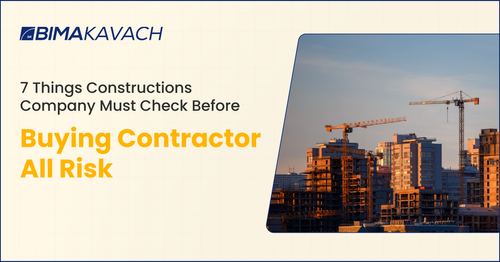In the hustling and bustling world of construction, risks are inevitable. From material shortages to weather-related delays, unforeseen challenges can quickly escalate into costly setbacks. Amidst these uncertainties, construction companies often turn to insurance to mitigate potential losses. One such insurance policy crucial for construction projects is the Erection All Risk insurance or EAR insurance. An EAR insurance policy in India provides comprehensive coverage for the risks associated with erecting machinery, plant, and steel structures. It protects against damages caused by accidents, natural disasters, and other unforeseen events during the installation phase of a project. However, selecting the right EAR insurance policy requires careful consideration of various factors to ensure adequate coverage and protection. In this blog post, we will look into seven essential things that construction companies must check before purchasing Erection All Risk insurance.
7 Crucial Considerations for Construction Companies Before Purchasing Erection All Risk Insurance
Given the unique challenges and regulatory landscape of the Indian construction industry, it's imperative for construction companies to carefully evaluate various factors before purchasing an EAR insurance policy in India. Here are seven crucial considerations for construction companies in this regard:
1. Coverage Scope and Exclusions
Understanding the coverage scope and exclusions of an erection all risk insurance policy is paramount. Construction companies should thoroughly review the policy to ascertain what risks are covered and which ones are excluded. Common inclusions may encompass damages due to fire, theft, vandalism, and accidental causes. Exclusions, on the other hand, could include wear and tear, faulty design, and pre-existing defects. It's essential to identify any gaps in coverage and negotiate with insurers to tailor the policy to specific project needs.
2. Policy Limits and Deductibles
Policy limits and deductibles determine the maximum amount an insurer will pay and the portion of the loss that the insured must cover, respectively. Construction companies must evaluate whether the policy limits adequately align with the project's scale and potential risks. Similarly, analyzing deductibles is crucial to determine the financial burden in the event of a claim. Opting for lower deductibles may result in higher premiums but could offer greater financial protection during unforeseen circumstances.
3. Insurer's Reputation and Financial Stability
Partnering with a reputable insurer with a strong financial standing is imperative for construction companies. Before purchasing erection all risk insurance, it's essential to research the insurer's track record, customer reviews, and financial stability ratings from independent agencies. A financially stable insurer ensures timely claim settlements and assures that the company can fulfill its obligations, even during economic downturns or catastrophic events.
4. Policy Endorsements and Extensions
Construction projects vary in complexity and scope, necessitating tailored insurance solutions. Policy endorsements and extensions offer additional coverage options beyond the standard policy provisions. Construction companies should explore available endorsements such as delay in start-up (DSU) coverage, which compensates for financial losses incurred due to project delays. Other extensions may include coverage for testing and commissioning, transit, and storage of materials. Assessing the need for endorsements and negotiating favourable terms with insurers can enhance the comprehensiveness of the erection all risk policy.
5. Compliance with Contractual Requirements
Many construction contracts, particularly those involving large-scale projects, mandate specific insurance requirements, including erection all risk coverage. Before finalizing an insurance policy, construction companies must ensure compliance with contractual obligations. Failure to meet these requirements could lead to contract disputes, project delays, or even legal liabilities. Collaborating closely with legal advisors to review contract terms and align insurance coverage accordingly is essential to mitigate contractual risks.
6. Claims Process and Support Services
An efficient claims process and access to comprehensive support services are crucial considerations when selecting an insurer. Construction projects are susceptible to various risks, and prompt claims handling is essential to minimize disruptions and financial losses. Construction companies should evaluate the insurer's claims handling procedures, including reporting mechanisms, documentation requirements, and turnaround times. Additionally, access to risk management resources, such as safety training programs and loss prevention services, can add value to the erection all risk insurance India policies.
7. Premium Costs and Payment Terms
While insurance premiums are a necessary expense, construction companies must assess the cost-effectiveness of EAR insurance relative to the coverage provided. Premium costs depend on factors such as project duration, scope, location and risk profile. Comparing quotes from multiple insurers and negotiating premiums based on risk mitigation measures can help optimize insurance costs. Additionally, reviewing payment terms, such as installment options and grace periods, is essential to ensure financial flexibility and avoid cash flow constraints.
The Footnote:
Erection All Risk Insurance in India plays a pivotal role in safeguarding construction projects against unforeseen risks and liabilities during the installation phase. However, selecting the right insurance policy requires careful evaluation of the factors discussed above. By considering these factors, construction companies can make informed decisions and secure comprehensive insurance coverage tailored to their project requirements. Investing time and effort in selecting the right policy can provide peace of mind and mitigate financial uncertainties throughout the construction process.

